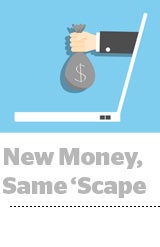LUMA Capital Partners, the newly minted venture capital arm of LUMA Partners (per an SEC filing earlier this year), announced Wednesday its first public investment with the ecommerce performance marketer HookLogic. Terms of the deal were not disclosed.
HookLogic, which positions search and display ads within a network of retail sites, is only six months out from a $15.5 million Series C (which included Intel Capital, where LUMA Capital’s general partner, Sumeet Jain, worked as a director at the time). But co-founder and CEO Jonathan Opdyke said the company was interested in “the strategic value and perspective of the LUMA team, being important prognosticators and having a big voice in the industry.”
Specifically, Opdyke wants HookLogic to expand the kind of inventory it can offer, and it hopes to use LUMA’s ad tech connections to realize that goal.
“What you’ll see over time is HookLogic becoming much more integrated with the digital ecosystem. Having LUMA on board helps us guide through that ecosystem and make it more aware of us,” he said.
And as an investor, LUMA Capital Partners certainly positions itself as a firm able to make those crucial connections.
“We expect that our expertise and ability to connect people in the space better than anybody else will help marketers want to work with us,” said Jain. “Our focus on the space and credibility means we deliver a lot of value to help them grow.”
Meanwhile LUMA, which has taken stakes in multiple marketing startups, was attracted to HookLogic because it’s technically part of the ad tech ecosystem but isn’t exposed to the intense direct competition that dictates life for others in the market.
(Granted, LUMA wasn’t really going out on a limb, as Jain was an early HookLogic investor and board member during his recent tenure at Intel Capital.)
“You really have to look hard for pockets in the market for companies that aren’t just beating each other up and commoditizing their tech and prices due to competition,” said Terence Kawaja, CEO and founder of LUMA Partners and an operating partner at LUMA Capital. “That’s the problem with the open ecosystem: It’s brutal.”
There aren’t many “defensible marketplaces” which can compete with the giants of the digital industry and aren’t plagued by fierce, duplicative rivals, said Kawaja. But HookLogic’s ability to “open up another source of revenue and allow retailers to monetize their own data” is a differentiator in a crowded field.
Retailers have long made money from more than just selling products, added Opdyke. “It’s about making money on the retail process.”
For example, Macy’s can sell search terms and shopper traffic on its ecommerce site to L’Oréal. Historically, retailers have monetized brick-and-mortar traffic in analogous ways, like by selling off premier shelf space to CPG brands or using in-store signage to direct foot traffic.
Because these ads show up on the same site where consumers will make their purchases, HookLogic says it offers a closed-loop advertising marketplace.
This ability to drive direct consumer actions is, according to Kawaja, “a shift from proxies and impressions to actual business outcomes.” And this shift is particularly important because Kawaja sees the market moving away from metrics like clicks and impressions.
“Look at how Facebook is positioning their offer as combining knowledge of the consumer and reach, and not anachronistic ideas about the number of eyeballs,” he said.
Kawaja noted the numerous challenges facing down the digital ad ecosystem, from fraud to viewability.
“If you sell business outcomes, then it obviates things like that,” he said.
LUMA Capital Partners aims to raise and invest $100 million in ad and mar tech startups.












